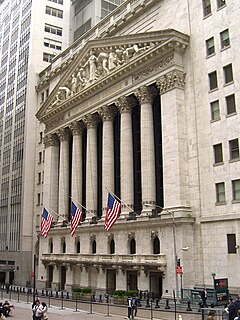
Preferred stock is a component of share capital that may have any combination of features not possessed by common stock, including properties of both an equity and a debt instrument, and is generally considered a hybrid instrument. Preferred stocks are senior to common stock but subordinate to bonds in terms of claim and may have priority over common stock in the payment of dividends and upon liquidation. Terms of the preferred stock are described in the issuing company's articles of association or articles of incorporation.

Common stock is a form of corporate equity ownership, a type of security. The terms voting share and ordinary share are also used frequently outside of the United States. They are known as equity shares or ordinary shares in the UK and other Commonwealth realms. This type of share gives the stockholder the right to share in the profits of the company, and to vote on matters of corporate policy and the composition of the members of the board of directors.

Corporate law is the body of law governing the rights, relations, and conduct of persons, companies, organizations and businesses. The term refers to the legal practice of law relating to corporations, or to the theory of corporations. Corporate law often describes the law relating to matters which derive directly from the life-cycle of a corporation. It thus encompasses the formation, funding, governance, and death of a corporation.

Salomon v A Salomon & Co Ltd[1896] UKHL 1, [1897] AC 22 is a landmark UK company law case. The effect of the House of Lords' unanimous ruling was to uphold firmly the doctrine of corporate personality, as set out in the Companies Act 1862, so that creditors of an insolvent company could not sue the company's shareholders for payment of outstanding debts.

A société à responsabilité limitée is a form of private company that exists mainly in French-speaking countries, such as France, Luxembourg, Monaco, Algeria, Morocco, Tunisia, Madagascar, Lebanon, Switzerland, and Belgium. The primary purpose of a SARL is to conduct commercial activity.

The United Kingdom company law regulates corporations formed under the Companies Act 2006. Also governed by the Insolvency Act 1986, the UK Corporate Governance Code, European Union Directives and court cases, the company is the primary legal vehicle to organise and run business. Tracing their modern history to the late Industrial Revolution, public companies now employ more people and generate more of wealth in the United Kingdom economy than any other form of organisation. The United Kingdom was the first country to draft modern corporation statutes, where through a simple registration procedure any investors could incorporate, limit liability to their commercial creditors in the event of business insolvency, and where management was delegated to a centralised board of directors. An influential model within Europe, the Commonwealth and as an international standard setter, UK law has always given people broad freedom to design the internal company rules, so long as the mandatory minimum rights of investors under its legislation are complied with.

United Kingdom insolvency law regulates companies in the United Kingdom which are unable to repay their debts. While UK bankruptcy law concerns the rules for natural persons, the term insolvency is generally used for companies formed under the Companies Act 2006. "Insolvency" means being unable to pay debts. Since the Cork Report of 1982, the modern policy of UK insolvency law has been to attempt to rescue a company that is in difficulty, to minimise losses and fairly distribute the burdens between the community, employees, creditors and other stakeholders that result from enterprise failure. If a company cannot be saved it is "liquidated", so that the assets are sold off to repay creditors according to their priority. The main sources of law include the Insolvency Act 1986, the Insolvency Rules 1986, the Company Directors Disqualification Act 1986, the Employment Rights Act 1996 Part XII, the Insolvency Regulation (EC) 1346/2000 and case law. Numerous other Acts, statutory instruments and cases relating to labour, banking, property and conflicts of laws also shape the subject.
Soden v British and Commonwealth Holdings plc [1998] AC 298 is a UK insolvency law case, decided in the House of Lords. It decided that damages for negligent misrepresentation inducing purchase of company shares are not "sums due" to shareholders for the purpose of the Insolvency Act 1986, s 74(2)(f), so that a claim for such damages is not subordinated to claims from other creditors.

United States corporate law regulates the governance, finance and power of corporations in US law. Every state and territory has its own basic corporate code, while federal law creates minimum standards for trade in company shares and governance rights, found mostly in the Securities Act of 1933 and the Securities and Exchange Act of 1934, as amended by laws like the Sarbanes–Oxley Act of 2002 and the Dodd–Frank Wall Street Reform and Consumer Protection Act. The US Constitution was interpreted by the US Supreme Court to allow corporations to incorporate in the state of their choice, regardless of where their headquarters are. Over the 20th century, most major corporations incorporated under the Delaware General Corporation Law, which offered lower corporate taxes, fewer shareholder rights against directors, and developed a specialized court and legal profession. Nevada has done the same. Twenty-four states follow the Model Business Corporation Act, while New York and California are important due to their size.

Bushell v Faith [1970] AC 1099 is a UK company law case, concerning the possibility of weighting votes, and the relationship to section 184 of Companies Act 1948 which mandates that directors may be removed from a board by ordinary resolution.

Pender v Lushington (1877) 6 Ch D 70 is a leading case in UK company law, which confirms that a company member's right to vote may not be interfered with, because it is a right of property. Furthermore, any interference leads to a personal right of a member to sue in his own name to enforce his right. As Lord Jessel MR put it, a member:
has a right to say, "Whether I vote in the majority or minority, you shall record my vote, as that is a right of property belonging to my interest in this company, and if you refuse to record my vote I will institute legal proceedings against you to compel you."

Re Barleycorn Enterprises Ltd [1970] Ch 465 is a UK insolvency law case, concerning the priority of creditors in a company winding up. It was held that fees for liquidation came in priority to preferential claims and floating charges. This was overturned by the House of Lords in Buchler v Talbot, but reinstated by Parliament through an amendment to the Insolvency Act 1986 s 176ZA.

Butt v Kelson [1952] Ch 197 is a UK company law and English trusts law case concerning the right of a beneficiary to direct its trustees to exercise votes on company shares that the trust possesses.

Isle of Wight Railway Company v Tahourdin (1884) LR 25 Ch D 320 is a UK company law case on removing directors under the old Companies Clauses Act 1845. In the modern Companies Act 2006, section 168 allows shareholders to remove of directors by a majority vote on reasonable notice, regardless of what the company constitution says. Before 1945, removal of directors depended on the constitution, however this case contains some useful guidance on how to properly construe the provisions of a constitution.

Imperial Hydropathic Hotel Co, Blackpool v Hampson (1883) 23 Ch D 1 is a UK company law case, concerning the interpretation of a company's articles of association. On the specific facts it has been superseded by the Companies Act 2006 section 168, which allows a director to be removed through an ordinary majority resolution of the general meeting.

Birch v Cropper (1889) 14 App Cas 525 is a UK company law case concerning shares. It illustrates the principle of exhaustion, that the rights attached to a share in an article would be presumed exhaustive, although one should construe the nature of a share with a starting presumption of equality.
Scottish Insurance Corp Ltd v Wilsons & Clyde Coal Co Ltd [1949] AC 462 is a UK company law case concerning shares. It illustrates that where the rights of shares are explained in the articles, that is likely to be an exhaustive statement.

Sinclair Investments (UK) Ltd v Versailles Trade Finance Ltd[2011] EWCA Civ 347 is an English trusts law case, concerning constructive trusts. Sinclair was partially overruled in July 2014 by the UK Supreme Court in FHR European Ventures LLP v Cedar Capital Partners LLC.

The British Virgin Islands company law is the law that governs businesses registered in the British Virgin Islands. It is primarily codified through the BVI Business Companies Act, 2004, and to a lesser extent by the Insolvency Act, 2003 and by the Securities and Investment Business Act, 2010. The British Virgin Islands has approximately 30 registered companies per head of population, which is likely the highest ratio of any country in the world. Annual company registration fees provide a significant part of Government revenue in the British Virgin Islands, which accounts for the comparative lack of other taxation. This might explain why company law forms a much more prominent part of the law of the British Virgin Islands when compared to countries of similar size.

Citco Banking Corporation NV v Pusser's Ltd[2007] UKPC 13 is a judicial decision of the Privy Council on appeal from the British Virgin Islands in relation to the validity of amendments to the memorandum and articles of association of a company, and the requirement of shareholders to exercise the votes attached to their shares in the best interests of the company as a whole.














